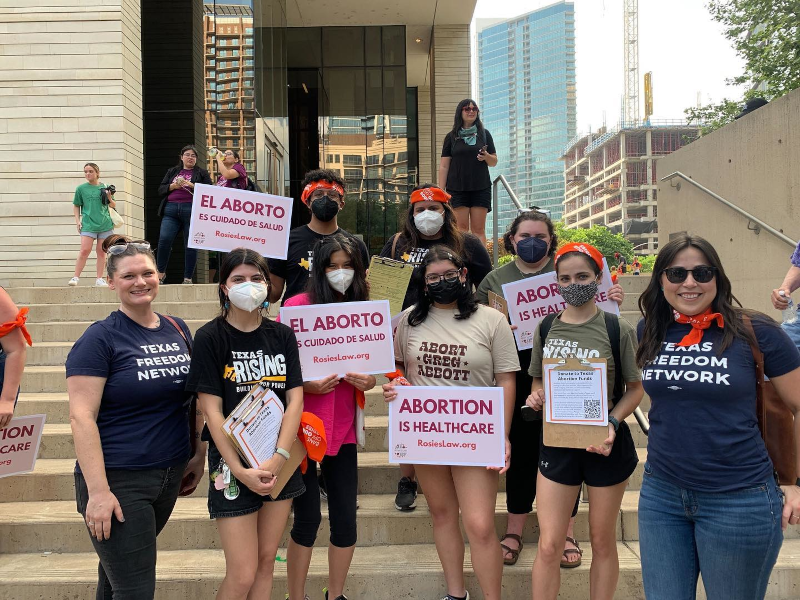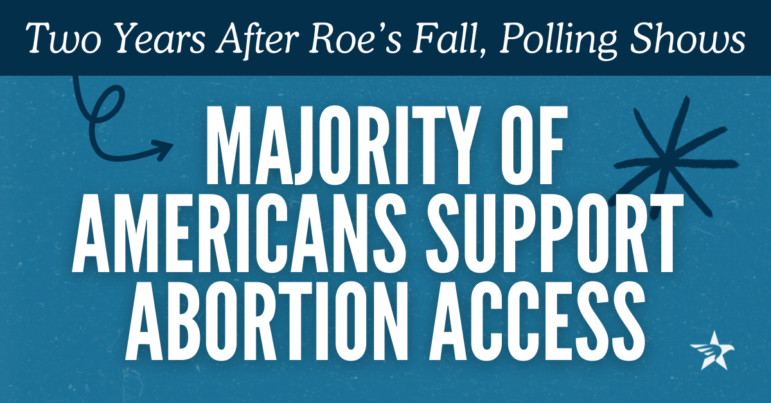Two years after Dobbs, we have now lived 730 days without the constitutional right to abortion. On June 24, 2022, the Supreme Court overturned Roe v. Wade through their ruling in Dobbs v. Jackson Women’s Health Organization, creating a treacherous patchwork of state and local laws criminalizing abortion.
In the years following the decision, vague restrictions and cruel bans are risking lives. Abortion is healthcare, and it is a decision that should be solely made by the person who is pregnant. But stories like Kate Cox and Amanda Zurawski’s, whose lives were both put at risk because of Texas’ abortion ban during planned, non-viable pregnancies, have an undeniable ability to shift perspectives. Their stories open the minds of those who may have been previously anti-abortion or simply didn’t consider it a key issue.
Roe deserves to be protected, but it was never enough to protect Black, brown, and other historically underrepresented communities. While abortion bans still disproportionately harm the same communities in a post-Roe world, the nation has been forced to see through these stories that no one is immune from the harm caused by abortion bans and stigmatizing views on reproductive health, no matter the color of their skin, immigration status, or financial resources.
We must go beyond Roe — and the start of our path forward begins by joining forces and using our collective power.
Research confirms what we have always known: The majority of voters believe we deserve freedom over our own bodies and futures through access to abortion care.
Broad support for abortion access and the issue’s ability to mobilize voters are all highlighted in PerryUndem’s recent study analyzing abortion opinions in a post-Dobbs world.
Here are some key findings:
*The survey tracked the responses of 3,000+ registered voters nationwide.

70% of voters surveyed agree that people should be able to make their own decisions about abortion without the government interfering
The majority of voters surveyed worry that abortion bans are connected to broader attacks on our freedoms, especially for historically underrepresented groups:
- 62% said the loss of abortion rights made them worried about losing more rights and freedoms
- 51% believe abortion bans disproportionately harm Black, Latino, Indigenous, LGBTQIA+ people, young people, people in rural areas, people with disabilities, and people with limited resources
Abortion access is still driving people to the ballot box:
- 56% of voters surveyed say the state of abortion rights will influence their voting decisions in 2024. In 2022, 59% said the Dobbs decision would have long-term effects on their voting decisions
- 59% of respondents say abortion is “extremely” or “very” important to their vote
- 79% of voters surveyed who support legal abortion say the issue is “extremely” or “very” important to them
Views among female Republican registered voters who were surveyed are shifting:
- 38% agree in 2024 that “Republicans’ views on abortion are too extreme,” compared to 22% in early June 2022 (pre-Dobbs)
You can see PerryUndem’s full report here.
The loss of Roe’s protection will always be devastating, but it continues to be true that the majority of the country, including Texans, support abortion access. Even as we remember the heartbreak of June 24, 2022, there are wins to celebrate:
- On June 13, 2024, the Supreme Court rejected a challenge to mifepristone’s FDA approval, keeping it accessible in states without bans and protecting medical abortion for Texans who must travel outside of the state for abortion care
- On June 11, 2024, the Amarillo City Council rejected a proposal to ban the use of the city’s roads and highways to seek an abortion out of state
- In January 2023, El Paso City Council passed the GRACE Act, stating that police will deprioritize investigations regarding people obtaining or aiding in abortions
- In the summer of 2022, cities across Texas, including Austin, San Antonio, Denton, and Dallas also passed the GRACE Act during their first city council votes
These hard-won victories are a testament to our people power. We will never stop fighting for our collective liberation. Together, we will regain freedom over our bodies and build a future free from stigma, where safe, legal abortion is accessible to all.



